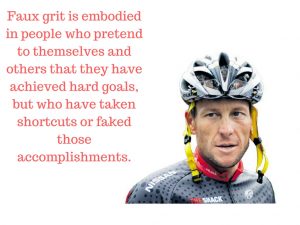Published by Inc.com, May 15, 2017
By Minda Zetlin
Sometimes the will to succeed is not enough
What does it take to be truly successful? Genius grant recipient Angela Duckworth and others have pointed to grit–the ability to persevere in the face of obstacles and setbacks–as a key quality that helps some people reach huge achievements while others fall short.
But, it turns out, there’s good grit and bad grit, according to executive coach and positive psychology expert Caroline Miller, author of Getting Grit: The Evidence-Based Approach to Cultivating Passion, Perseverance, and Purpose, which is coming out next month.
Miller believes some people have “authentic grit,” which she defines as “the passionate pursuit of hard goals that awes and inspires others to become better people, flourish emotionally, take positive risks, and live their best lives.” People with authentic grit have humility and seek to learn what they don’t know in order to make the best decisions, she says. Others make decisions for the wrong reasons, or don’t really find ways to fulfill their goals.
Here are some of the most common mistakes Miller sees leaders make, and how to avoid making them yourself:
1. Not admitting when it’s time to make a change.
Miller calls this “stubborn grit” or “stupid grit.” She describes it as, “the stubborn pursuit of goals in spite of the fact that reality is demonstrating that the goal is no longer appropriate because the situation has changed.”
People with stubborn grit believe they have a superhuman ability to make things happen against all odds, she explains. They do the hard work needed to succeed, but fail to recognize that what they’re working so hard at no longer makes sense.
On the other hand, the annals of successful business are filled with examples of people who persevered even when all the odds seemed to be against them. So how can you tell when it makes sense to keep working toward an impossible goal and when you should change direction? Miller recommends getting advice from some people you trust on these difficult decisions by creating a personal “board of directors.” “This board should consist of people, coaches, and/or mentors who are unafraid of sharing their unvarnished feelings with you, and whose advice you respect,” she says. “Regular check-ins with these people can help you avoid stupid or stubborn grit.”
2. Not holding yourself accountable for your goals.
You set an ambitious goal that you plan to achieve within six months. But then six months goes by and you haven’t even taken the first step. The truth is, you were so wrapped up in the day-to-day rush of running your business or doing your job that you never even got a chance to think about your long-term goals.
Because life gets busy for everyone, and most especially for entrepreneurs, it’s important to create some system that forces you to review your goals and your progress toward them on a regular basis. One way to do this is to use your calendar and make appointments with yourself for dates by which you’ll complete your objectives. Another is to find an accountability buddy who will check in with you on a regular basis to see what kind of progress you’re making.
Miller suggests yet another simple but powerful technique: Email. “One great way to make yourself accountable for your goals is to schedule emails that will be delivered to you in the future, reminding you of steps you need to take and why your goal is so important, and challenging you to remain committed.” There are multiple ways to do this, such as the “snooze” feature in Gmail, or using FutureMe.org.
3. Failing to ask why.
If you don’t understand why something hasn’t happened, you probably won’t be able to make it happen. So Miller recommends an exercise she calls the “Five Whys.” “Think about something you are not doing well, or at all, that you want to change,” she says. “Next, ask yourself, ‘Why is that so? Why haven’t I been [doing whatever it is]?'”
You’re not just looking for the reasons whatever it is hasn’t happened yet, she says. You also want to examine those reasons, asking “Why is that so?” until you have at least five whys. “It’s this kind of persistent inquiry that will allow you to discover the root of your problem and where you can begin to make the changes that will have a domino effect,” Miller says.
4. Making decisions too quickly.
This is a tricky one, because making decisions too slowly can be just as much of a problem as making them too fast. But, Miller notes, “A unique piece of research on waiting to make a decision found something intriguing:
When you decide to defer making a decision until you have slept on it, sometimes for many nights, you learn that patience in making a decision leads to valuing patience itself, and even deciding that long-term rewards are better than short-term payoffs.”
The solution, Miller says, is to make a date with yourself for when you will make the decision. “Choose to choose in a few weeks.”
5. Setting achievement rather than performance goals.
What’s the difference? A performance goal is one that depends only on your own action, for instance to write a blog post every week. An achievement goal may be the result of your action but not in a way that you can control or even predict, such as to double your blog’s readership. There are lots of reasons why it’s smarter to set performance rather than achievement goals, but one of them is that reaching for an achievement goal encourages you to take shortcuts that may not help you in the long run–having “faux grit,” as Miller puts it.
People with faux grit “are the high flyers who proclaim success and earnings while cooking the books,” she says. “The only way to evade faux grit is to decide to take the patient, slower road to success, and to be surrounded by people who are honest and trustworthy.” And, she adds, “The proper way to achieve difficult goals is to set a ‘do your best’ deadline, and to expect a learning curve.”
CLICK HERE for original post.




